HBO’s new series Westworld has probably got a lot of people reconsidering their most recent Grand Theft Auto V murder spree.
Reconsidering, though probably not regretting. On the one hand, the first two episodes of HBO’s new sci-fi drama have asked us to at least entertain the idea that the computer-controlled civilians we just mowed down have personalities and inner lives. On the other hand, it comfortingly shows us a fictional form of entertainment so far advanced beyond modern video games that we won’t lose much sleep over the virtual citizens we just killed. Our current video game moral quandaries remain safely abstract and philosophical. GTA’s androids do not yet dream of electric sheep.
Westworld’s setup, briefly: At some unclear date in the future, enterprising content creators have devised a wild west theme park populated by remarkably lifelike androids. Human “guests” pay an astronomical fee for the freedom to walk amongst the synthetic “hosts” and do whatever they want, which usually means screwing or murdering everything in sight.
As the show begins, the hosts have begun to exhibit erratic behaviour as the result of a software update. By the end of the first episode, it’s clear that the synthetic hosts are in the early stages of widespread self-awareness. Given how they have been treated by the park’s guests over the years — raped, tortured, and murdered over and over again — that awakening is likely to involve some retribution.
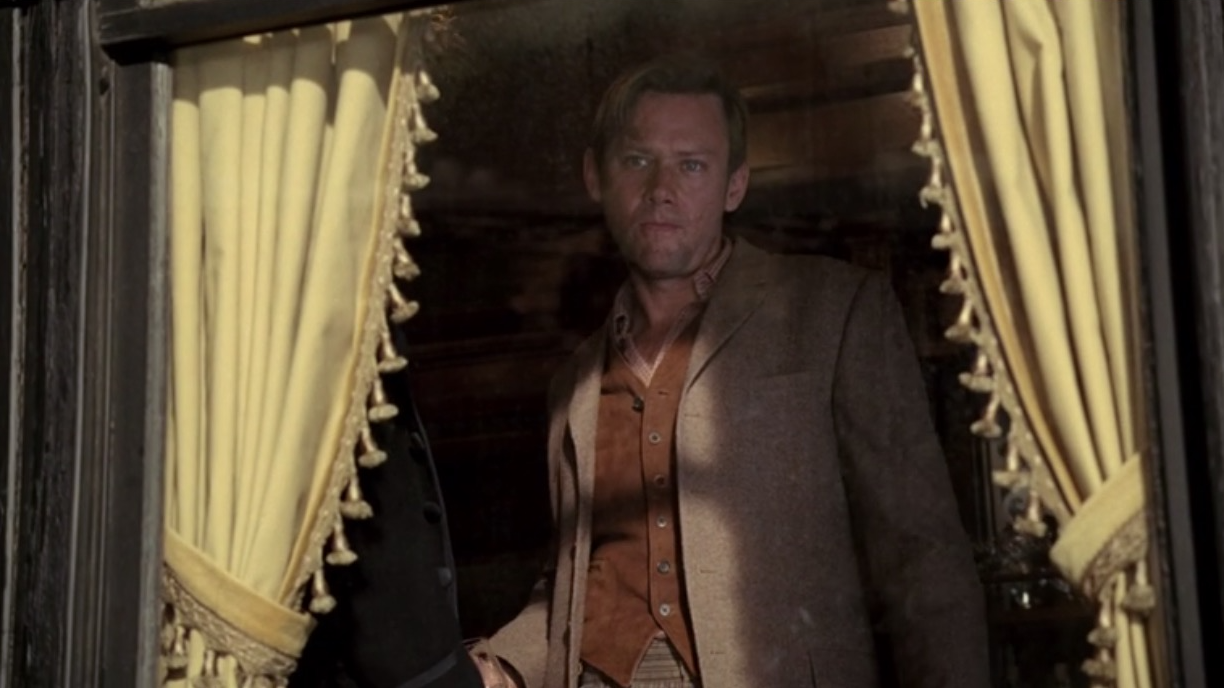
In the second episode, we get to see Westworld through the eyes of a first-time guest named William. Before he is set loose, William asks if there’s some sort of orientation. “No orientation,” his host responds. “No guidebook. All you do is make choices.” Sounds familiar, right?
As it is imagined on the show, Westworld is a fanciful but in many ways logical endpoint for the current trajectory of emergent, open-world games. The artificial intelligence and world construction are so advanced that there’s no one narrative for players to follow, just a world filled with stories to uncover. All you do is make choices.
Because of this framework, Westworld is explicitly a show about gamers and game designers. Many of us have taken a turn as Ed Harris’ Man in Black, putting on our bandana in Red Dead Redemption and shooting up a saloon. Maybe we left a bound woman on train tracks just to earn the Achievement. Harris’ scenes are filmed with such casual cruelty that they’re hard to watch. I imagine that’s the point, but it doesn’t make his scenes go down any easier.
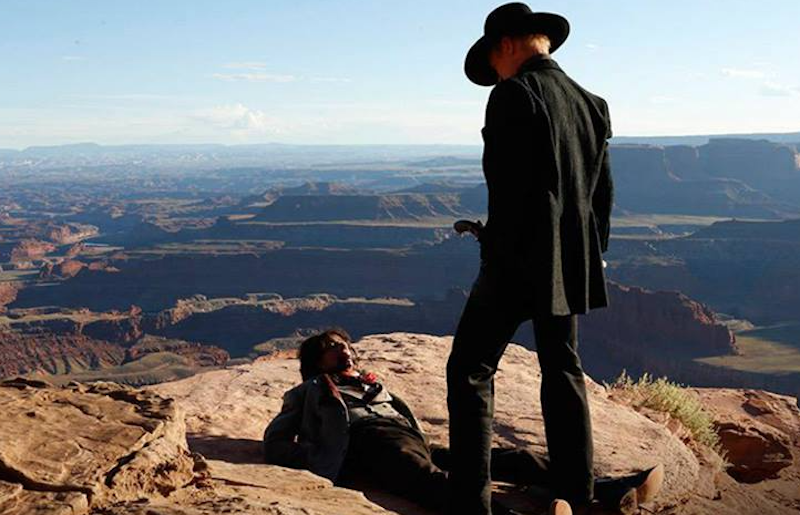
The Man in Black may seem like a monster, but in a lot of ways he’s just another gamer. He’s just playing the “game” of Westworld more actively than any of the other human guests. After 30 years coming to this place, he’s moved on from traditional gameplay and begun hunting secrets and easter eggs. He’s searching for some mythic second layer, a labyrinth within the game. Many a gamer can tell you that once they get tired of staging ever-more-elaborate heists and shootouts, the next level of a game often involves trying to creatively break it.
Meanwhile behind the scenes, the central conflict between Westworld’s staff involves a debate about narrative design. The park’s lead writer Lee Sizemore pitches a particularly blood-drenched story for the new “season” of Westworld, but the park’s founder, Anthony Hopkins’ Dr. Ford, shuts him down. Ford says that people don’t come to Westworld for the stories they can be told, but rather for the stories they themselves can tell. Similar disagreements have doubtless been hashed out in many a video game writers’ room.
“What is the point of it?” Ford asks. “Get a couple cheap thrills? Some surprises? But it’s not enough. It’s not about giving the guests what you think they want. That’s simple. The guests don’t return for the obvious things we do, the garish things. They come back because of the subtleties, the details. They come back because they discover something they imagine no one had ever noticed before. Something they have fallen in love with. They’re not looking for a story that tells them who they are. They already know who they are. They’re here because they want a glimpse of who they could be.”
Last weekend during a New York Comic-Con panel (per Variety), husband and wife Westworld creators Jonathan Nolan and Lisa Joy discussed the show’s video game influences. Among other things, Nolan talked about how Joy plays Grand Theft Auto. “My wife is the world’s more boring Grand Theft Auto player,” he said, “She’s the only person I know who stopped at traffic lights.”
“The city looks beautiful if you just slow down and take your time,” Joy responded.

She’s right. The city does look beautiful if you just slow down and take your time. I remember forcing myself to walk the entire circumference of GTA V, slowing down whenever possible to take in the sights and sounds. It took me several hours. The amount of detail in that world is jaw-dropping, and we so often miss it because we’re too busy with our nose in a mini-map, cruising to our next mission, our next destination.
Here at Kotaku, I write a tongue-in-cheek series called “The Secret Lives of NPCs.” In addition to walking around and sightseeing, I like to consider the non-player characters I’ll find standing around. What must their lives be like? What do they do when I’m not around? I celebrate the Assassin’s Creed guy who exists solely for us to knock him into the Thames. I apologise to the Hitman cook I’ve clubbed with a hammer so many times.
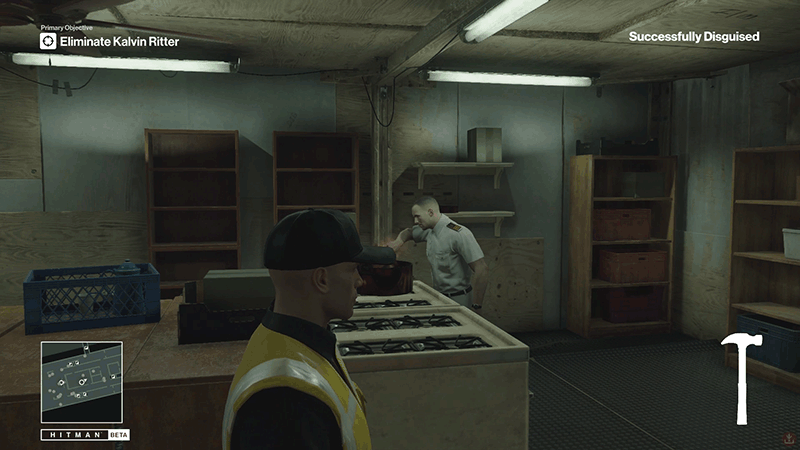
I have fun with these articles, but I’ve always been aware of their darker subtext. These fake people exist solely to have violence perpetrated against them or, at best, to bear witness to violence perpetrated against others. Westworld makes that subtext explicit in an upsetting and provocative way.
The more realistic video games become, the more challenging it will be to approach them with the same cavalier “do whatever you want” attitude with which we approached Grand Theft Auto III back in 2001. When the airport civilians screamed and ran in Modern Warfare 2’s infamous 2009 “No Russian” level, it was genuinely disturbing. When a 2014 upgrade to GTA V let us maraud around in first-person, violence against the virtual citizenry felt shocking and transgressive in a way the series hadn’t managed in years. The more advanced this technology gets, the more obviously horrifying some of our in-game actions will be.
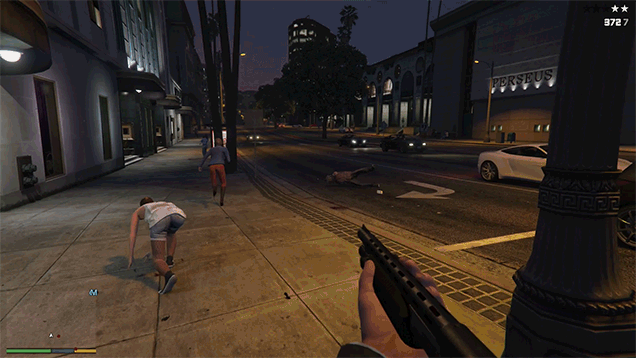
It’s one of the most interesting questions Westworld asks about artificial intelligence and game design. We’ve been trained to see video games as contraptions to be manipulated and mastered. Game-makers often add a veneer of humanity to their systems; they give their logic puzzles personalities and make the target dummies scream and bleed. Game players, on the other hand, are skilled at stripping those layers of humanity away to better focus on the systems within. In many video games, NPCs are little more than cordwood to be chopped and stacked and re-arranged as we see fit. They don’t matter.
Westworld questions that premise, offering a pointed critique of modern AAA game design by imagining and interrogating the games we might one day play. If an artificial intelligence were sophisticated enough, would it fundamentally change the way we interact with it? If you remove enough layers of abstraction, are people less willing to inflict harm on an artificial construct? Or is the opposite true? Will we gradually become so desensitised to this stuff that we will become the Man in Black, inflicting the most outrageous pain imaginable in the pursuit of something we haven’t seen or felt before?
What will it take to shock me now? These days when I watch a clip of “No Russian” I don’t see screaming civilians; I see strained seams. I notice how cynical it is, with its obvious attempts at manipulation. I’m similarly less shocked by GTA V’s first-person violence than I was the first time I saw it.
During a particularly grim act of violence in Westworld’s second episode, the Man in Black ruminates on his own desensitization. “It’s beautifully done, really,” he says, as his helpless victims sob. “But you see the cracks after a while. That’s why I like the basic emotions. You know what that means? It means when you’re suffering, that’s when you’re most real.”
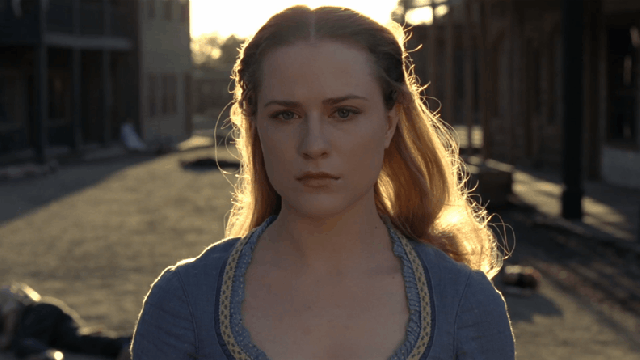
Comments
33 responses to “The Video Game Horror Of HBO’s Westworld”
I like the series so far but I don’t get having the players essentially be in permanent god mode with no consequences for being shot doesn’t make much sense to me
I get it. People often like the experience of having power over others and no consequences to their actions. Not always, but often (see Stanford Prison experiment, blue eyes-brown eyes experiment, history).
The “fun” in Westworld isn’t just immersing yourself in a Western, it’s that experience. If that creeps you out, Westworld isn’t for you. But it would be for others.
Agreed. There has to be danger or the game becomes meaningless. How do you do that in a Westworld setting though when YOU are in the game? The only way it would work is to do it like Avatar. All hypothetical of course ….
It’s about playing out fantasies though, not playing a game. The whole idea behind the original was being able to visit, enjoy being whoever you wanted to be with no consequences. Think of the times you played a game as a kid with god-mode on and still wrecked everything in site. I’ve done that plenty of times!
I just read it as simple safety thing. Not good for business if people die, and given the amount of guns in the ‘world’, it would happen sooner or later.
The AI are already able to shoot at the guests it just has no consequence, as in the first episode, I’m not talking about anyone getting hurt just something like losing points or temporarily be out of the game. Ashigaru thats fun for a few minutes as an adult but thats it, you wouldn’t have people come back if there is no challenge to the game. Sprupet I didnt mention being creeped out, I’m talking about boredom, with no challenges it would get old really quickly.
Because management’s intent was to study human behaviour and replicate it.
That way, the newcomers get swapped with the hosts during the Westworld visit, then it’s not the newcomers who depart after the visit is over… instead, it’s the hosts who get sent out into the real world without anyone realizing it.
That was the plot for the sequel, and it was AWFUL
Nope. I’ll still shoot first, think later.
AI is hardly at Westworld levels yet
Anybody see the original movie? I’m not sure how it’s panning out in the modern series as I’ve not watched it, but it was a much simpler premise. An AI character, the gunman goes rogue and hunts down guests (as do most of the antagonist AIs in the various worlds). I’m just wondering if this will follow a similar vein or take a different path…
It’s following a different path, but they do allude to an “incident” that happened 30 years previously. The movie may be being weaved into the series as part of its past.
OOOOH really? Ok cool. I’m going to look into it 😀
Loving it. Im a huge fan of the original Yul Brynner movie and like the Crichton novel. Hoping season 2 (they’re already onto writing it, not confirmed as renewed, but all but a done deal given its ratings) gones into further detail on the company, given the original movie mentioned things like Roman World, Medieval World, Future World etc, I wonder if these will get a look in too at some point?
I always found the idea of Futureworld to be ridiculous. I mean, if it is supposed to be so immersive that the guests think its real then surely the technology to achieve that look/feel has then already been achieved and therefore is Presentworld.
But being on a space station, or some form of extra-terrestrial colony/outpost etc may not be something that they could achieve even with the technology to make the parks. Getting things to space on a regular basis, let alone interstellar travel is going to take some pretty massive efforts!
Yeah, I see your point, I guess in my mind I’m thinking of that as like Spaceworld or something else in which case I’m on board. I’d sell all my worldly possessions if it would allow me to board the Nostromo as a Colonial Marine and kill some Xenomorphs alongside Ripley.
Don’t go on the Nostromo mate, that’s the ship from Alien where nobody knows what’s up hahaha. Make sure if you’re getting a ride, your ticket says Sulaco 😉
Deep Space Nine would open up a lot of potential.
I read somewhere the other day that the cost per episode (something like $9m per) means its prohibitively expensive to consider those other parks. Doesnt mean they cant change their minds though. Westworld was mentioned as one of three in the first ep though, so they are out there.
They also said that “Westworld itself is just the beginning”, how I’d love to see the cowboys etc to spill over into the Roman times when eventually all the androids start going berko 😀
That scene in the original film where he stumbles into Roman world and you’re just like “oh…. everything is already absolutely stuffed” is pretty good.
FutureWorld was actually from the god awful sequel movie they made about the re-opened expanded park. But Roman world and Medieval world would be cool
Yul Brynner is pretty kick ass!!!! He has been in some of the coolest movies. ‘Don’t smoke kids’ :’-(
The show mentioned doing things like that too, they said last week one of the hosts had been a character in their old Shakespere attraction.
Yep, I can see them definitely going into other places in future seasons, they did say the wild west setting was ‘just the beginning’, it’s intriguing to say the least. I can definitely see this becoming HBO’s interim GOT replacement at this rate (although only for 3 years given its definite 5 year lifespan (2 crossover years)).
I think if the guests knew that the hosts had gained self awareness / consciousness, it would change their behaviour, to the point where they would demand their freedom. We are afforded a view that shows the possibility, but the guests and even most of those who run the park seem to be under a genuine assumption that these are not sentient beings. Even the man in black as you noted in the final paragraph, is able to define characteristics of the hosts that give them away as non-human; at this point in the story at least it is possible to argue that he is as innocent to their true nature as the other guests.
Given the way the game of Westworld works a few things nade me go WTF.
Even though the hosts cant harm players.. they still do shoot players directly with the same guns that damage and hurt hosts with the full intent to kill and the bullets go POOF.
Whats stopping another player assaulting another player?
Are the players aware they are monitored?
In a game that allows murder pillage and sexual activity that can/may be violent, why are thier children hosts… or for that fact why do parents take their small children their. Thats urgh sick! In WoW you cant damage children npcs whats preventing that in Westworld
I was really wondering that last week, they did mention something this week about players not being able to ‘shoot’ other players but I’m still not sure how that’d stop things like knives or simply beating them to death.
Someone mentioned that to me the other day and I agree but it wouldn’t surprise me in the real world, People let their kids play R-rated games now, willing to bet they would/will in the future too.
I’m actually hoping this is shown, like a safety protocol maybe, it’d be great to see the androids restrain another human who assaults a human perhaps?
It was mentioned in episode 2 that there are certain areas that are safe for children, the family with the little boy mentioned they shouldn’t have crossed the river.
As for why there are children hosts that can be harmed… well… I guess they cater for the sickest fantasies.
#NPCLivesMatter
i was actually thinking about this after the last episode. with AI where is the exact point where something becomes too real to “use” as an NPC in a game either killing, or doing something even darker to them.
the show reminds me alot of fallout 4 with its synth issue, but westworld does it better with little techniques like seeing row upon row of hosts standing in cold storage, or a host raising its arm to command in a test area. you get to see the side the corporation has that they are just toys for rich assholes rather than beings that can feel pleasure or pain
The problem I have with Westworld is that its trying to be some commentary on video game violence that’s solely based on the view that video games bring out violence and the worst in people. The problem here is that that point of view is pretty much based on nothing. It’s from the perspective of people who don’t play video games and have no idea what that world is really like. The whole “black hat/white hat” dicotemy is wholly unrealistic. Almost NOBODY plays a video game to simply “rape and murder” as the show seems to indicate is pretty much the reason people go to Westworld. A lot of the carnage from video games: innocent people being mowed down; is incidental, and only occurs as a side effect of people with a higher purpose: trying to win the game. It’s a pretty nihilistic view of society and says infinitely more about the shows creators than it is any kind of legitimate commentary on society. Not only that, but what does Westworld offer to women? The whole old west motifs is basically a completely outdated patriarchal fantasy. As a matter of fact, gaming is one of the most progressive mediums of entertainment. Sure there are some unsavory elements in gaming culture but for the most part gamers and game producers are much farther ahead of other mediums like film-where Nolan has cut his teeth-that cater to and promote patriarchy by paying male actors more than their female counterparts and use white men and their experiences as the driving force behind almost every narrative.
Anyway, after four episodes this video game violence trope is already getting extremely old, I only hope the shows producers have something more interesting to say over the course of the season. I do enjoy the questions around consciousness and AI, but those questions could have been asked without suggesting that trauma from rape and violence are somehow the trigger that encourages higher thought. It seems counter intuitive and almost forced because the producers seemed like they were dying to share this concocted message of video game violence.